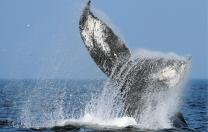Whale watching is big business: tourists spent more than $125 million on tickets and travel to Stellwagen in 2008. They spent about $2.1 billion to see cetaceans around the world. According to whale biologist Roger Payne, it is essential that such visitors “become awestruck by whales.” Whale watchers, not scientists, are going to determine their fate.
Here are a few things that endangered species have done for local communities. Manatees attract hundreds of thousands of visitors to Florida each year, where they spend more than $23 million to see the sirenids in Blue and Homosassa Springs. Reef-based tourism around the Florida Keys is almost entirely dependent on the dominant (and federally listed) staghorn and elk-horn corals; the industry employs more than 43,000 people whose annual wage income totals $1.2 billion. Reefs supply more than half a billion people with food and work, buffering coastlines from waves and producing sand for the beaches—each hectare of reef generates up to $130,000 of ecosystem services, the benefits that nature provides for free. The bad news: more than 200 species—a third of all reef-building corals—are at risk (from bleaching and other diseases), and the buildup of CO2 from the burning of fossil fuels is likely to change the entire chemistry of the seas. Only amphibians appear to be in a tighter death spiral.
Americans spent more than $120 billion hunting, fishing, and wildlife watching in 2006. That’s more than the Super Bowl. It’s more than professional football. It’s more than was spent on all spectator sports, amusement parks, casinos, bowling alleys, and ski slopes combined. Hard to believe, until you consider that more than 71 million Americans spent more than $45 billion just on observing and photographing wildlife. They spent the money on food, lodging, and transport, on guides and fees to access public and private lands, on bird food, binoculars, spotting scopes, and backpacking equipment, on nature magazines and guidebooks. This passion for simply watching nature resulted in more than a million jobs.
A common complaint is that wild areas reduce the tax base in a community—I heard it in Boiling Spring Lakes. I heard it in Florida. But the Departments of the Interior and Commerce and the Census Bureau have been gathering data since 1955. The most recent study showed that wildlife watching brought in almost $9 billion in tax revenues to state and local governments. And this doesn’t even include other local services such as storm protection or the provision of fish and freshwater, or global ones like climate regulation.
The figures for bird-watchers alone are staggering: there are 48 million in the United States, compared to about 33 million anglers and hunters. Most birders just enjoy keeping an eye on their feeders and the birds that visit their backyards; but around 20 million travel each year to see birds, averaging about two weeks on the road. That’s a lot of birders, and a lot of cash. Just as cities compete for stadiums and factories, communities should vie for parks and charismatic fauna. Whooping cranes in Aransas and Necedah, bald eagles at Mason’s Neck, and ivory-bills—well, maybe in Arkansas.
There’s always the risk that visitors will outnumber—or out-race—their subjects. As dolphin tourism grew in Shark Bay, Australia, the number of dolphins declined. A single tour operator had no discernable effect; but once a second boat began operating, one in seven dolphins left the bay, calving rates declined, and areas with no tour boats showed an increase in these small cetaceans. So the Minister of the Environment revoked one of the licenses as a necessary sacrifice to keep the dolphins—and the tourists—in the bay. Shark Bay, remote and small, was a pretty easy call. On Stellwagen, more than a dozen whale-watching companies have agreed to voluntary guidelines created to avoid whale strikes and to keep whale-watching vessels from pursuing, tormenting, or annoying them. Will that prove good enough for the whales?







